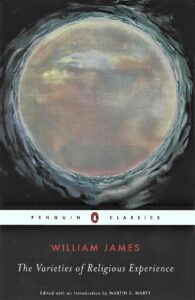The Varieties of Religious Experience – A Study in Human Nature
By William James (1842 - 1910), edited with and Introduction by Martin E. Marty.
534 Pages | First published in the U.S.A. by Longmans, Green & Co in 1902, published in the Penguin Library in 1982, reprinted in Penguin Classics 1985 | Softcover | Penguin Books Ltd., London | ISBN:
Dutch translation: Vormen van Religieuze Ervaring - Een Onderzoek naar de Menselijke Aard | First Dutch publication 1907, sixth revised and extended publication 2010 | Softcover | Abraxas, Amsterdam.
'Standing at the crossroads of psychology and religion, this groundbreaking work applied the scientific method to humankind's religious behavior'.
William James believed individual religious experiences, rather than the precepts of organized religions, were the backbone of the world's spiritual life. His discussions of conversion, repentance, mysticism, and saintliness - and his observations on actual, personal religious experiences - all support this thesis.
In his Introduction, Martin E. Marty discusses how James' pluralistic view of religion led to his remarkable tolerance of extreme forms of religious behavior, his challenging, highly original theories, and his welcome lack of pretension in all of his observations on the individual and the divine.
From Lecture VIII - 'The Divided Self and the Process of its Unification' (p. 168):
" I have ever been the queerest mixture of weakness and strength, and have paid heavily for the weakness. As a child, I used to suffer tortures of shyness, and if my shoe-lace was untied would feel shamefacedly that every eye was fixed on the unlucky string; as a girl I would shrink away from strangers and think myself unwanted and unliked, so that I was full of eager gratitude to any one, who noticed me kindly; as the young mistress of a house I was afraid of my servants, and would careless work pass rather than bear the pain of reproving the ill-doer; when I have been lecturing and debating with no lack of spirit on the platform, I have preferred to go without what I wanted at the hotel rather than to ring and make the waiter fetch it. Combative on the platform in defense of any cause I cared for, I shrink from quarrel or disapproval in the house, and am a coward at heart in private while a good fighter in public. How often have I passed unhappy quarters of an hour screwing up my courage to find fault with some subordinate, whom my duty compelled me to reprove, and how often have I jeered at myself for a fraud as the doughty platform combatant, when shrinking from blaming some lad or lass for doing their work badly. An unkind look or word has availed to make me shrink into myself as a snail into its shell, while, on the platform, opposition makes me speak my best. "
- Annie Besant in An Autobiography, 1893, 2003.
 Bezig met bijwerken...
Bezig met bijwerken...